British Producer Defends Putting White Woman In 'Brownface' For Muslim Documentary
A U.K. television program’s attempt to shed light on Islamophobia is proving controversial ― with some critics claiming that the show’s tactics amount to “brownface.”
“My Week As A Muslim,” which aired on Channel 4 this Monday, follows the journey of a white woman named Katie Freeman. As part of a social experiment, Freeman is immersed into a Pakistani Muslim family in Manchester who lived just a few miles away from her own home.
While the purpose was to start a conversation about Islamophobia, the documentary has been criticized for its methods. In order to go “undercover” in her neighborhood, Freeman’s skin was darkened, and she was given a prosthetic nose, fake teeth, and brown contact lenses. She also donned a long, flowing robe and covered her head with a scarf.
The racist origins of blackface, brownface, and other costumes stemming from cultural appropriation are well documented. The impulse to assume another ethnic group’s features often results in exaggerated, inaccurate, and even harmful stereotypes.
In this case, the apparent use of “brownface” had some critics appalled.
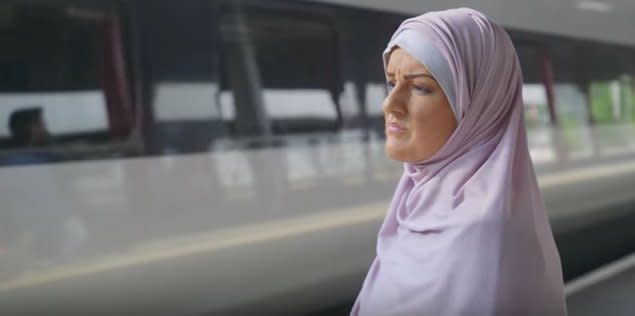
I remember getting that nose and teeth in my muslim starter pack when I converted. Don't leave home without it. #myweekasamuslim
— Mosh Khan (@mosh_k88) October 23, 2017
Okay I get what #AsAMuslim is trying to do but slapping on prosthetic make-up?! What the hell does Muslim look like? We come in all colours!
— Humza Yousaf (@HumzaYousaf) October 23, 2017
Journalist Radhika Sanghani wrote in the Guardian that while highlighting the effects of Islamophobia is a worthy goal, showing a white woman “browning up” with a larger, wider nose and fake teeth is not the way to do it.
“Instead of perpetuating old cliches and focusing on physical appearance, [the documentary] could have simply followed a Muslim family with cameras, hearing from the women themselves and observing the everyday racism they experience,” Sanghani wrote. “Women of colour are already under-represented in the media – why not give them a voice and hear from them directly?”
In a parody of the documentary, British-Iraqi freelance writer Ruqaya Izzidien, flipped the roles around ― imagining what it would be like if a Muslim went “undercover” as a white man.
“Channel 4′s My Week as a Muslim was a preposterous conception from the first minute, providing a platform for racism, brownface, crude caricatures, ethnocentrism and general all-round offence,” Izzidien wrote, summarizing her opinion of the show. “It was built on the antiquated, imperialist concept that a person of colour’s word cannot be trusted; their experiences and suffering don’t exist until they are verified by a white person.”
God forbid you ask an actual Muslim woman what it's like 🙄 We're not locked away you know, how else would I be tweeting?? #MyWeekAsAMuslim
— Shehnaz Khan (@shehnazkhan) October 23, 2017
The show’s producer, Fozia Khan, defended the decision in a Guardian op-ed, saying that Freeman’s appearances were changed to make her “look and feel different, so she could go unrecognised in her hometown, convincingly experience what it’s like to be a Muslim woman, integrate her into her host community and experience it from within.”
″People have suggested that we could have used a different approach – such as giving Muslim women hidden cameras to show their experiences. This has been done before, and we wanted to try something different,” Khan wrote.
Khan wrote that when Freeman started the documentary, she had negative opinions about Muslims. She reportedly felt fearful about women wearing the niqab. At one point in the documentary, she says, “You see them and you think, are they going to blow something up?” But over the course of the filming, as she has meaningful conversations and experiences with Muslims, her opinions begin to change.
Saima Alvi, the Muslim woman from Greater Manchester whose family Freeman befriended, wrote about this transformation in a blog for HuffPost. Alvi said she was initially reluctant to participate in the documentary, but decided to go through with it after being reassured that she would not be misrepresented.
Watch a trailer for the show below:
After the Manchester bombing, which happened just one day into filming the documentary, Freeman and Alvi watched the footage from the attack on television together. They were both uncertain about whether to continue.
“Katie was worried that she might become a target dressed as a Muslim woman which was an important realisation. I explained that my attire is part of my identity and I must carry on in the outside world carrying this fear,” Alvi wrote. “We both decided to continue with the further five days of filming.”
After the attack, Freeman experiences what it was like to walk through the neighborhood as a visible Muslim woman during a tense time ― feeling fearful while simply walking down the street.
Love HuffPost? Become a founding member of HuffPost Plus today.
No one should have to fear walking down the street every day... #MyWeekAsAMuslim pic.twitter.com/14gqQsDP1t
— Channel 4 (@Channel4) October 24, 2017
“I’m just sick of it, the stuff they were shouting,” she said after being heckled on camera. “But that’s, it’s only for a few days, isn’t it? You know, and I can take this off and I’ll go back to being Katie and they probably wouldn’t even make a comment, would they? But for like, Saima, if she come here and her family came here, they’d have that abuse all the time, wouldn’t they?”
Alvi argued that Freeman’s prosthetic nose and other facial changes were meant to be a disguise ― and that the makeover was never intended to mock an ethnic group, or create a caricature.
“The programme made me realise that there are genuinely decent people out there who lack the opportunity to engage with the Muslim community,” Alvi wrote in her blog. “Thus their opinions are based on the commonplace demonisation of Muslims, which is generally perpetuated by the media. Katie was willing to learn about the environment she was immersed within and therefore changed many of her former negative opinions.”
Khan claimed that her team met and received approval of the idea from Manchester’s British Muslim Heritage Centre. But The Muslim Council of Britain, an umbrella body of over 500 Muslim organizations, told HuffPost that they wished Khan had also reached out to the national body.
“There is value in consulting national Muslim bodies for advice, over and above the individuals in the programme, as this may help the production understand the potential national impact of sensitive issues - the strength of feeling of which appears to have been underestimated,” a spokesperson said in a statement.
The Council nevertheless commended the documentary’s participants.
“We would like to praise the participants who demonstrated some of the best qualities and characteristics in the face of real challenges.”
Also on HuffPost
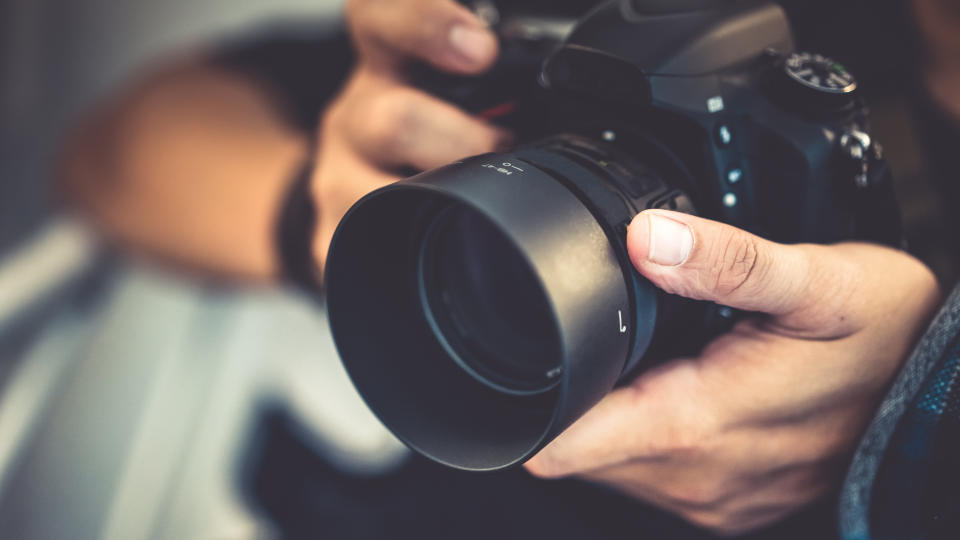
Check out photos from Guzman’s project below, along with captions explaining each subject’s favorite verse. Some of their responses have been edited for clarity. Follow the series as it unfolds on Guzman’s Instagram account.
Myree, Medical Assistant, California
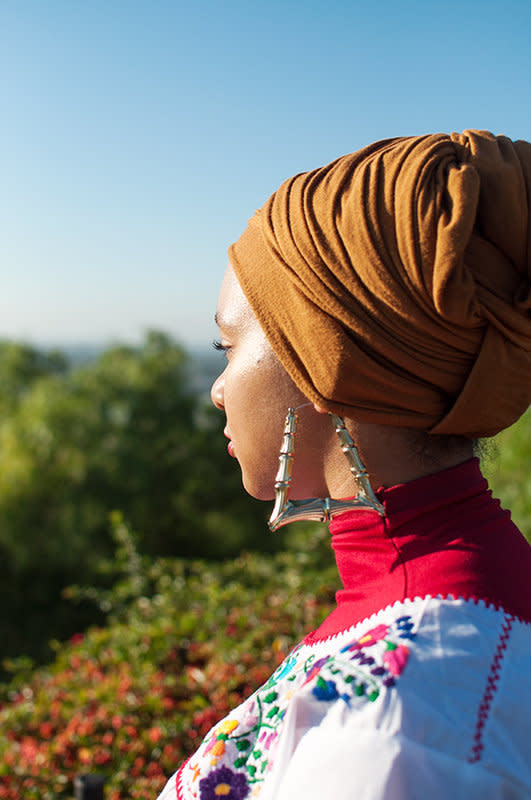
"This is so important to me not only as a Muslim but also as an Afro-Latina. This states that Islam is against racism and discrimination. All humans are created equal. All that matters to God is the good a person does and the devotion we have for our creator." - Myree
Shadi, College Student, Boston

"This hadith is one of my favorites because it talks about being mindful of our parents. In today’s world, a lot of people do not respect their parents and treat them as if they are nothing. Of course there are times when our parents get on our nerves but before I even think or dare to say anything to them, I remember this hadith and it brings me back to reality. It allows me to do good instead of bad and this has helped me build a stronger relationship with my parents." - Shadi
Kenneth, College Student, California
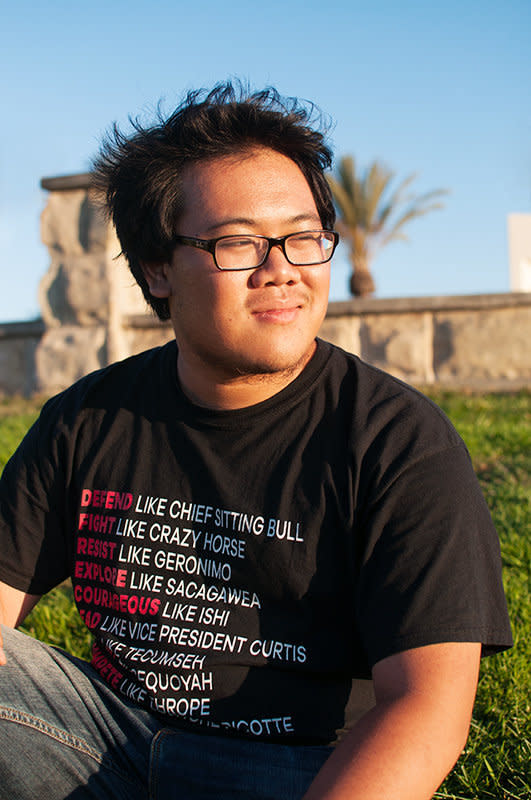
"These verses remind me to always place my trust in God, no matter how hard things get. I have had lots of ups and downs in my life in terms of mental health. During my downs, I remember this verse and it motivates me to keep hope in the future, and to keep hope in myself. It reminds me of the power of prayer, as God can turn any situation around. When we have faith in God, He will set things moving for us in ways that we cannot even imagine." - Kenneth
Rula, College Student, Louisiana
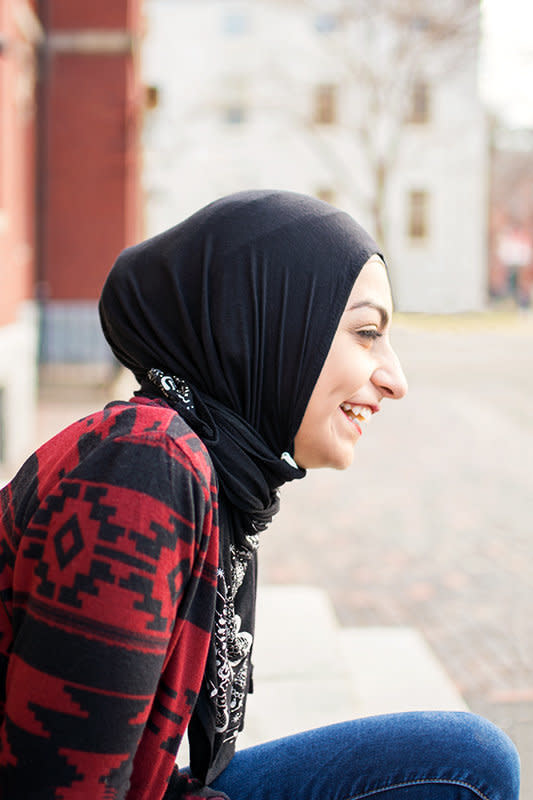
"This verse, to me, is a significant reminder of Allah (God). Remembering to say 'inshallah,' if God wills, before speaking about plans is acknowledgement that as humans, we are not in control of everything. In a sense it is reassuring and personal because it relates to everybody. Growing up, it’s common that parents tell their kids 'inshallah' as a way to brush off their requests, as in 'OK, OK, if God wills.' I know my parents did. But as I grew older, I understood the value in relying on God and the love bestowed upon us. It’s a reminder of our humanity, and how not everything is in our control. To see God in all things is to also see God in our daily lives in the smallest plans we make, such as studying for a test, or even getting coffee. God is so great, and it is a reminder not to stress with all the free will we have." - Rula
Fida, Librarian Aide, Oregon
![<i>“In the name of Allah, the Entirely Merciful, the Especially Merciful. [All] praise is [due] to Allah, Lord of the worlds. The Entirely Merciful, the Especially Merciful, Sovereign of the Day of Recompense. It is You we worship and You we ask for help. Guide us to the straight path. The path of those upon whom You have bestowed favor, not of those who have evoked [Your] anger or of those who are astray.” – Quran Chapter 1 / Verses 1-7</i><br /><br />"I chose the verses from the first chapter (Al-Fatiha) of the Quran. These verses remind me of my childhood. My sisters and I would all gather together and we would recite it together or one by one. We were so proud of ourselves when we memorized it and we could see our parents were proud of us too. This <i>surah </i>(chapter) is the first in the Quran and I have always said it in times of fear, when I would think a ghost was in the room or if I was walking home late. I knew <i>Allah </i>(God) was watching and helping me. These words are powerful and they have helped me feel and be protected." - Fida](https://s.yimg.com/ny/api/res/1.2/KpFosAtlBu5vDU6K8NMEmw--/YXBwaWQ9aGlnaGxhbmRlcjt3PTk2MA--/https://img.huffingtonpost.com/asset/596657282100003400fc68c1.jpg)
"I chose the verses from the first chapter (Al-Fatiha) of the Quran. These verses remind me of my childhood. My sisters and I would all gather together and we would recite it together or one by one. We were so proud of ourselves when we memorized it and we could see our parents were proud of us too. This surah (chapter) is the first in the Quran and I have always said it in times of fear, when I would think a ghost was in the room or if I was walking home late. I knew Allah (God) was watching and helping me. These words are powerful and they have helped me feel and be protected." - Fida
Osoul, Nursing Student, New Jersey
![<i>“Allah does not burden a soul beyond that it can bear.” - Quran Chapter 2 / Verse 286<br /></i><br />"This specific ayah has gotten me through so much in my life, Alhamdulillah [Praise be to Allah]. I have had to deal with a lot growing up, whether it was family, illnesses or loss. In a way I was forced to mature at an early age and growing up I always wondered, 'Why!' You know, like why things happened the way they happened. But once I started getting closer to Allah, I realized that asking why things happen the way they do is the wrong approach to life. Instead we should ask Allah to make us strong enough to handle any obstacles thrown our way. Now every time something happens, I read this ayah and I remember that Allah will not burden me with anything I cannot handle. Allah won’t burden me with something that will destroy me, it will only make me stronger for what is ahead inshallah. It is kind of like a little hope, you know, the light at the end of the tunnel." - Osoul](https://s.yimg.com/ny/api/res/1.2/WVr2getw83Xt.oguBFhGdA--/YXBwaWQ9aGlnaGxhbmRlcjt3PTk2MA--/https://img.huffingtonpost.com/asset/596657281500002000bfd3f1.jpg)
"This specific ayah has gotten me through so much in my life, Alhamdulillah [Praise be to Allah]. I have had to deal with a lot growing up, whether it was family, illnesses or loss. In a way I was forced to mature at an early age and growing up I always wondered, 'Why!' You know, like why things happened the way they happened. But once I started getting closer to Allah, I realized that asking why things happen the way they do is the wrong approach to life. Instead we should ask Allah to make us strong enough to handle any obstacles thrown our way. Now every time something happens, I read this ayah and I remember that Allah will not burden me with anything I cannot handle. Allah won’t burden me with something that will destroy me, it will only make me stronger for what is ahead inshallah. It is kind of like a little hope, you know, the light at the end of the tunnel." - Osoul
Nooran, College Student, New Hampshire
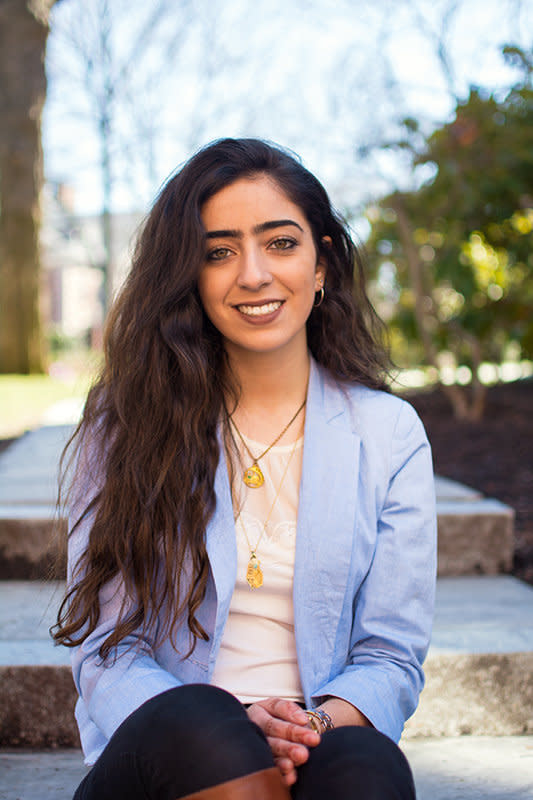
"I think it's the story and context of that verse that makes it my favorite. It is a prayer said by the Prophet Yunus (Jonah), who is swallowed by a whale and seems in a hopeless situation stuck in its belly. He makes this prayer when he realizes he has disobeyed God, and continues to repeat it so often that all the fish in the sea can hear him reciting it. God spares Yunus and he is spit out by the whale. This verse teaches me two very important things that I try to apply to my daily life. The first is that when a situation seems hopeless, put all your faith in God and rely on Him to make things better. The second is that self-critique is necessary even in hard times. The Prophet Yunus could not understand why God was doing this to him until he reflected and realized that he had been of the wrongdoers. In that very same way, we should strive to always reflect and better ourselves even in the hardest of times instead of being frustrated or angry at God." - Nooran
Hana, College Student, Georgia
![<i>"[Moses] said, 'No! Indeed, with me is my Lord; He will guide me.'" - Quran Chapter 26 / Verse 62</i><br /><br />"An ayah (verse) so simple and powerful, yet can be difficult to recollect when we allow this reality and this world to cloud our own visions. When I thought I was capable of carrying and dealing with everything on my own, I found myself lost, hurt and misguided. I allowed myself to forget that Allah (swt) can heal all my wounds and guide me, if I just called on Him. I had willingly clouded my own vision.<br />No doubt, this life can be difficult at times. Hardship, confusion, pain and doubt are inevitable. All of humanity, believers and atheists, experience suffering and aching, however, the ones who truly believe and call on Allah (swt) will be at ease. Despite any circumstances, they rest knowing The Lord of Heavens, Earth and everything in between is in charge. They trust His plan and allow their hearts to focus. They know they are not capable of everything; they are simply imperfect humans. Humans who don’t allow this reality to cloud their visions. A human I strive to be." - Hana](https://s.yimg.com/ny/api/res/1.2/g35DPr76_gRatyWaLQoZog--/YXBwaWQ9aGlnaGxhbmRlcjt3PTk2MA--/https://img.huffingtonpost.com/asset/596657282100003400fc68c0.jpg)
"An ayah (verse) so simple and powerful, yet can be difficult to recollect when we allow this reality and this world to cloud our own visions. When I thought I was capable of carrying and dealing with everything on my own, I found myself lost, hurt and misguided. I allowed myself to forget that Allah (swt) can heal all my wounds and guide me, if I just called on Him. I had willingly clouded my own vision.
No doubt, this life can be difficult at times. Hardship, confusion, pain and doubt are inevitable. All of humanity, believers and atheists, experience suffering and aching, however, the ones who truly believe and call on Allah (swt) will be at ease. Despite any circumstances, they rest knowing The Lord of Heavens, Earth and everything in between is in charge. They trust His plan and allow their hearts to focus. They know they are not capable of everything; they are simply imperfect humans. Humans who don’t allow this reality to cloud their visions. A human I strive to be." - Hana
Bushra, College Student, Texas
![<i>“And We have enjoined upon man [care] for his parents. His mother carried him, [increasing her] in weakness upon weakness, and his weaning is in two years. Be grateful to Me and to your parents; to Me is the [final] destination.” - Quran Chapter 31 / Verse 14</i><br /><br />"No religion puts greater emphasis on the status of parents in society than that which Islam puts. We always hear that a 'mother knows best,' but sometimes in life we get carried away by our own faults, forgetting to turn to those who know us the most. I'm always terrified that a day will come in which I can no longer write my mother's name and number as my emergency contact, whether it be for school or any other endeavor of mine. This verse keeps me grounded; it reminds me that life is short, so short, too short, and that one should never, ever take the lives of one's parents for granted." - Bushra](https://s.yimg.com/ny/api/res/1.2/s0XVc1i9BxhVsbyjo6anVg--/YXBwaWQ9aGlnaGxhbmRlcjt3PTk2MA--/https://img.huffingtonpost.com/asset/59665728180000a085673ed4.jpg)
"No religion puts greater emphasis on the status of parents in society than that which Islam puts. We always hear that a 'mother knows best,' but sometimes in life we get carried away by our own faults, forgetting to turn to those who know us the most. I'm always terrified that a day will come in which I can no longer write my mother's name and number as my emergency contact, whether it be for school or any other endeavor of mine. This verse keeps me grounded; it reminds me that life is short, so short, too short, and that one should never, ever take the lives of one's parents for granted." - Bushra
Zarin, College Student, South Dakota
![<i>“And a sign for them is the night. We remove from it [the light of] day, so they are [left] in darkness. And the sun runs [on course] toward its stopping point. That is the determination of the Exalted in Might, the Knowing. And (as for) the moon, We have ordained for it stages till it becomes again as an old dry palm branch. It is not allowable for the sun to reach the moon, nor does the night overtake the day, but each, in an orbit, is swimming.” - Quran Chapter 36 / Verses 37-40</i><br /><br />"The reason I love these verses so much is that they are almost a reiteration of the age-old saying, and my personal favorite calming mechanism, that Allah does everything for a reason. If we ever look up to the sky to ask why the sun acts the way it does and why the moon acts the way it does, we can see that He has created a relationship between the two celestial bodies so that they work in harmony and makes sure that neither overpowers the other. It is also a beautiful image and representation and model of how we as humans should work, in harmony, never overtaking each other to benefit and 'over show' our power, but to work together and cooperate in peace as well as we can." - Zarin](https://s.yimg.com/ny/api/res/1.2/q3FdWoeH2fm0jLbilxFk3w--/YXBwaWQ9aGlnaGxhbmRlcjt3PTk2MA--/https://img.huffingtonpost.com/asset/5966572a2100003700fc68c2.jpg)
"The reason I love these verses so much is that they are almost a reiteration of the age-old saying, and my personal favorite calming mechanism, that Allah does everything for a reason. If we ever look up to the sky to ask why the sun acts the way it does and why the moon acts the way it does, we can see that He has created a relationship between the two celestial bodies so that they work in harmony and makes sure that neither overpowers the other. It is also a beautiful image and representation and model of how we as humans should work, in harmony, never overtaking each other to benefit and 'over show' our power, but to work together and cooperate in peace as well as we can." - Zarin
Samah Safi Bayazid, Filmmaker, Washington, D.C.
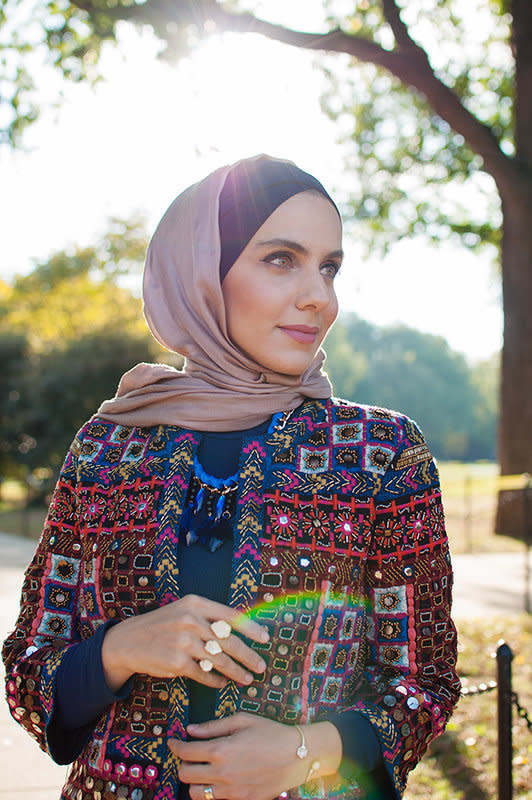
"This is one of my favorite verses in the Holy Quran. It really touches my heart, so I can relate to it in my life. 'Good word' and 'good work' is what I try to spread through my social media, where I’m very blessed and honored to have over 200,000 followers. As a filmmaker, some of our works like the American drama series 'Inspiration' got millions of views and cleared many misconceptions about Islam and American Muslims. Many people tell me that my words/works have inspired them and touched their hearts and lives. This always makes me think about the power of sincere words and actions, and how words can really be like 'a good tree whose roots are firm and whose branches are in heaven.' I hope that some of my words and works can become like a good tree in my lifetime and after I leave this world too." - Samah
Yousef, High School Student, Chicago
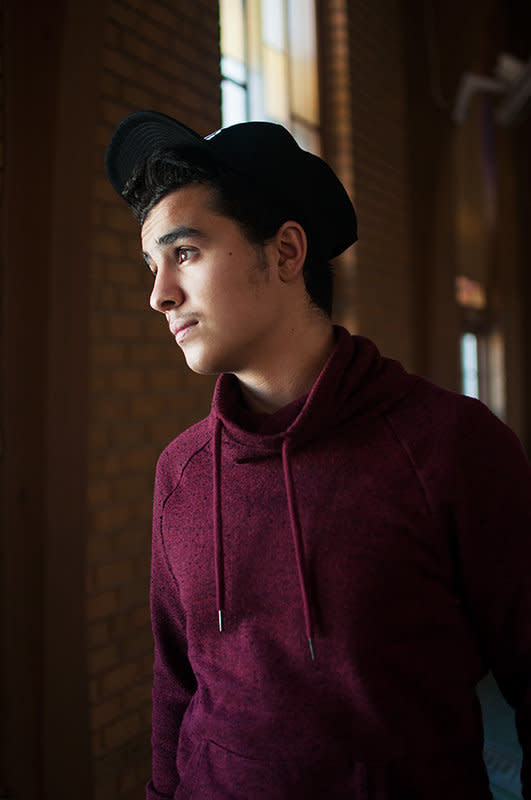
"This hadith has had a great impact in my life. When I was a little younger, I loved to give charity to others in front of people. I wanted to be seen in the public eye as a good kid; it mattered what people thought of me. Little did I know I was only looking to gain the pleasure of the people around me and not the pleasure of Allah. I was not thinking whether or not what I was doing made Allah be pleased with me. Then one day I heard this hadith and I knew I had to change the way I did things and my intentions toward doing them. I realized that the way I thought was wrong and that if I wanted to do a good deed, I needed to do it for the sake of Allah only. I understood that only through the pleasure and love of Allah I could gain the love of the people." - Yousef
This article originally appeared on HuffPost.

